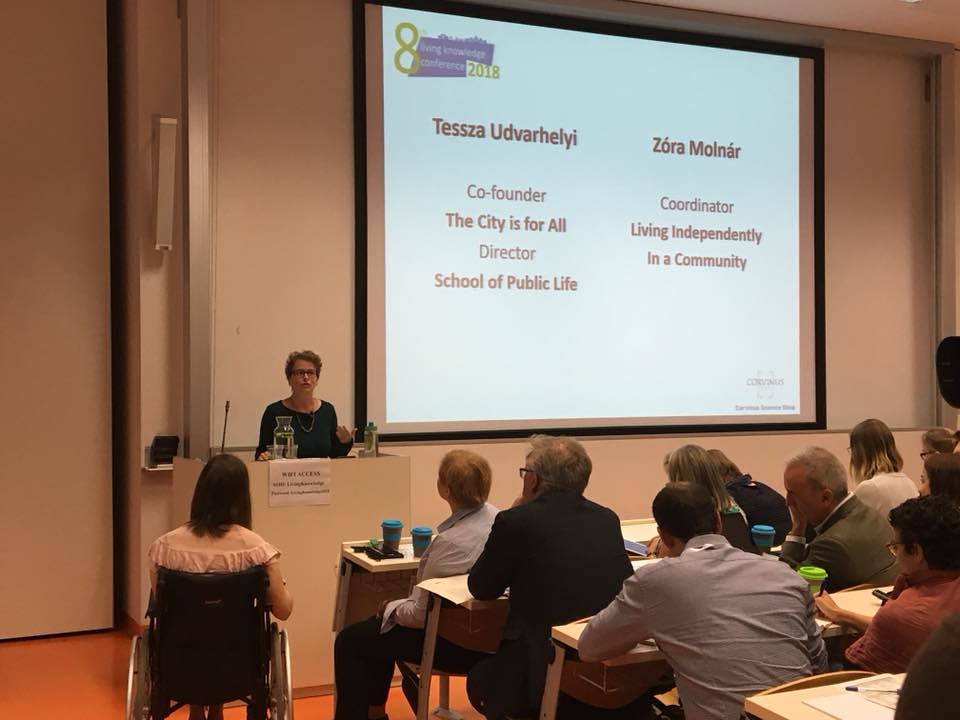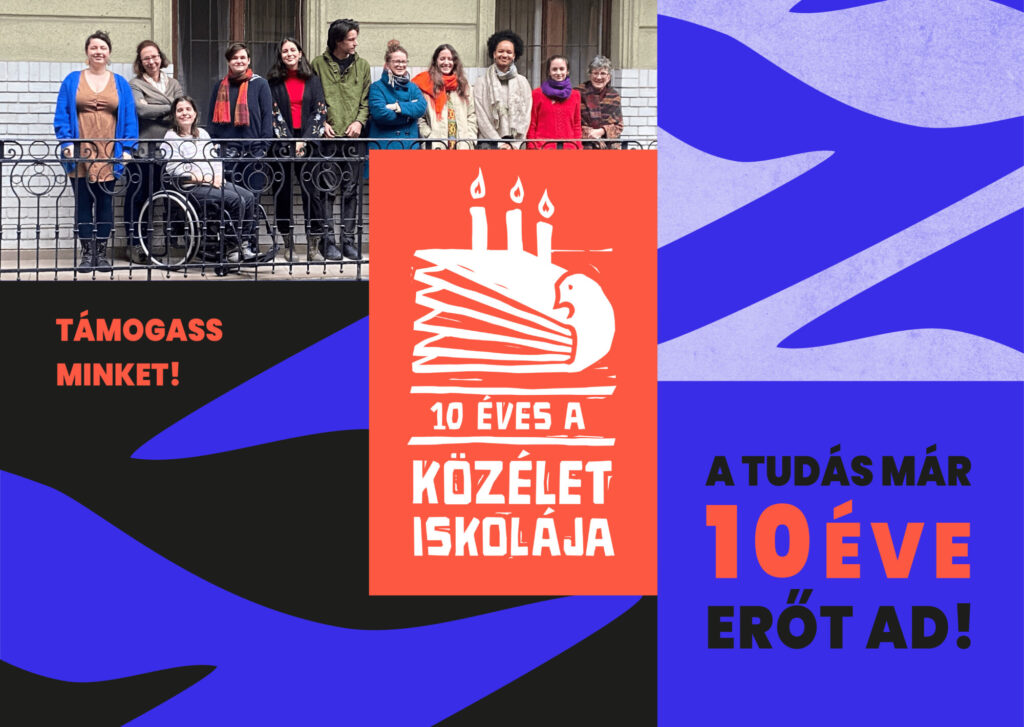Thank you very much for this opportunity – it is such an honor to be here for both of us. in the next few minutes we will share some of our personal stories and experiences of how research changed our lives and led us to become activists.
I started out my life as a researcher out of pure academic interest in the notions of cleanliness and purity, following in the footsteps of my favorite anthropologist Mary Douglas. But I also heard of applied anthropology during my studies and had a feeling that I should do research that is not only useful for me, but also for society. At this point, I had no idea what this meant, but it sounded important…
For months, my co-researcher and I had been looking for a topic that would meet these two criteria. Then in 2002 we found a short article in a newspaper that reported on a new program launched by the mayor of Budapest to clean (and this is the word they used) the underground pedestrian passages of Budapest from 3 things: graffiti, illegal vendors and homeless people.
So we dug into this topic and stuck with it for three years. Over these years, I got more and more angry at what I discovered. In the interviews we made and the texts we read, the politicians and technocrats of Budapest kept trying to convince me that they were doing what all the so-called decent residents of the city wanted: clean the city of undesirables and give it back to us, decent people. In other words, as it turned out, homeless people were chased away in my name and to serve my imagined needs as a white middle-class resident.
I come from a safe middle class background with many privileges. One of these is a secure home and the other is almost unlimited access to quality education. Even though I was vaguely aware of these, this research forced me to take a harder look at my own position in the world and the things I take for granted. It was definitely a process of awakening.
More importantly, this research did something I never even knew was missing: it helped me discover my political self. It not only made me angry as an individual but also made me think about my role in reproducing injustice and about WHO was responsible for changing what I was angry about.
After we completed the research, we started thinking about how to make it “useful for society” as we heard it so often in school. We contacted different NGOs, sent them our study and were really HOPING that they would use our findings. One of these organizations was Man on the Street, an activist network fighting for the right to housing. And this is where my life changed for good.
This organization did not just thank us for our work, but invited us to join them. If you really want to do something about it, you need to take responsibility for it – this is basically what they told us. You can’t just HOPE that your academic work will be useful for someone somewhere but you actually have to TAKE ACTION to make this happen. You have to seek out opportunities, not just wait for them. You have to actively engage with civil society organizations and social movements if you REALLY want your work to be used.
They will never come to you and ask you for your help – you have to go ahead and make sure the knowledge you produced is available to as many people as possible. And this part they did not teach me at the university.
In the end, I did actually join this group and became an activist. For the first few months, I was telling myself that I was there out of a sense of duty: that I had to follow through with my research, making sure that the group understood what we found and knew how to use it for their own purposes. And then another important thing happened.
In 2005 the Budapest general assembly proposed a law that would ban begging in all the public spaces if Budapest. At first the group was not sure whether they wanted to step up against this proposal. However, as this was one of the topics that we covered extensively in our thesis, I showed them historical and international examples of how the criminalization of begging is nothing else than the criminalization of poverty. It took some convincing, but we finally did decide to organize against it and I found myself as one of the organizers of a protest in front of the city hall as the voting took place. We actually won and the ban was not passed.
The next day I was travelling by tram and as I was thinking about the protest, I suddenly had this very strong sense of power come all over me. It was a feeling that I never had before and will never forget. I know this sounds a bit cheesy, but this was the moment that I was actually born as a citizen. Now I know that before I was only the skeleton of a citizen. For the very first time in my life, I had actually managed to intervene into the life of a larger collective, the society I was living in and this was both necessary and liberating.
Since this moment, I have been an activist for housing rights. In 2009, I co-founded The City is for All, the only grassroots housing advocacy group in Hungary. A unique feature of this group is that its membership includes homeless, formerly homeless people and middle class allies such as myself. For nine years now, we have worked together, sharing our skills, knowledge and experiences to achieve housing rights for everyone in Hungary.
So it was through research that I found my citizenship, but only by consciously going beyond the academic realm and making a personal effort at achieving change. HOPE was not enough. It was through action that I was able to take responsibility for change.
Later, I realized that if research was something that could politicize and liberate me, it can have the same effect on other people, too, especially those who suffer from the most serious forms of oppression and exclusion. However, in the traditional university setup, these are exactly the people who are not present – or if they are, they are always the objects of research. Their ideas and needs are always being studied by other people, which definitely does not lead to their liberation – but often to further stigmatization.
As I was struggling with these issues, I was lucky to discover the world of participatory action research as an approach where people who are affected by a social issue are not studied as in a laboratory but actively engage in research themselves to understand the structural roots of their problems and then take action to change the situation. In this case, research goes way beyond the walls of the university and becomes a path towards full citizenship – something that is essential for oppressed groups to challenge their oppression.
In the School of Public Life, a community-based education center, where I work today, we believe – as one of our participants put it – that democracy is not a noun but a verb – it only exists if we do it. We offer courses, workshops and open forums where people can learn about social and political inequalities and develop their skills in both the everyday representation of their interests and more large-scale advocacy and movement building. Many of our students come from socially disadvantaged backgrounds, but we also have many middle-class people who are interested in becoming activists or simply active citizens.
In the School we see participatory action research or PAR as a form of critical pedagogy. PAR is a long-term form of political education where people explore the conditions around them, connect the dots, draw the conclusions and also think about ways to take action. And in this process, they go through the same process of becoming a citizen as I did back in 2005. In our participatory action research projects people with no academic background and often little formal education who were the victims of different kinds of social oppression discovered their own citizenship and responsibility by asking questions, collecting data, formulating answers and planning actions.
In the PAR projects I have been involved in, we have explored the various forms of discrimination homeless people face in public spaces, uncovered the history of housing movements in Budapest and studied the conditions of independent living for people with physical disabilities – all with the people who are directly affected by these issues. I have learnt a lot during these projects – not only from what we discovered, but also – and mostly – from my co-researchers.
I personally don’t believe in individual research anymore. I believe in collective, participatory research where knowledge is not produced for the sake of abstract academic ideals or professional career building, but is shared broadly and is a means to empowering people to become fully fledged political beings in the world. In other words, I believe in research that produces citizens, who take responsibility for change. And I believe universities have a central role in understanding, embracing and promoting research of this kind.
Of course, I don’t believe that everyone should be an activist or that participatory research is the only valuable approach to the production of knowledge. I believe that there are many ways for s to take responsibility for change. What I do believe though, is that universities and other academic spaces have to be places where these questions are not only addressed as abstract topics or even worse, as niceties, but as key political questions that everyone has to find their own answers to. In a world where masses of people are deemed politically, economically and socially useless, the university and the intellectuals it socializes have to take a leading role in helping all of us discover the real meaning of our citizenship and challenge the political, social and economic conditions that dehumanize all of us.
Presented at the 8th Living Knowledge conference (Budapest, May 30-June 1, 2018.)





